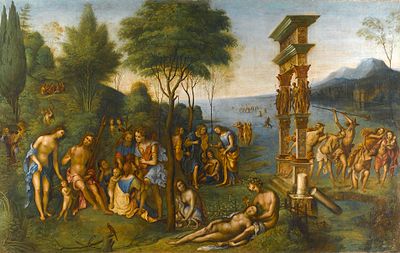- Comus
-
For other uses, see Comus (disambiguation).
 The Reign of Comus by Lorenzo Costa.
The Reign of Comus by Lorenzo Costa.
In Greek mythology, Comus or Komos (Ancient Greek: Κῶμος) is the god of festivity, revels and nocturnal dalliances. He is a son and a cup-bearer of the god Bacchus. Comus represents anarchy and chaos. His mythology occurs in the later times of antiquity. During his festivals in Ancient Greece, men and women exchanged clothes. He was depicted as a young man on the point of unconsciousness from drink. He had a wreath of flowers on his head and carried a torch that was in the process of being dropped. Unlike the purely carnal Pan or purely intoxicated Bacchus, Comus was a god of excess.
Contents
Comus in art
Description of Comus as he appeared in painting is found in Imagines (Greek Εἰκόνες, translit. Eikones) by Philostratus the Elder, a Greek writer and sophist of the 3rd century AD.
Lorenzo Costa depicted Comus in his painting The Reign of Comus.
Comus appears at the start of the masque Pleasure Reconciled to Virtue by Ben Jonson and in Les fêtes de Paphos (The Festivals of Paphos), an opéra-ballet by Jean-Joseph Cassanéa de Mondonville.
In John Milton's masque Comus, the god Comus is described as the son of Bacchus and Circe. However, this is just a post-classical invention.
Comus is featured in the baroque operas Les plaisirs de Versailles by Marc-Antoine Charpentier and King Arthur by Henry Purcell and John Dryden.
A selfish dandy, Comus is the central character in the novel "The Unbearable Bassington" by Saki (H.H. Munro).
Other
Comus is the namesake for the oldest Carnival organization in New Orleans, the Mistick Krewe of Comus.
Comus is also the name of a little-known and short-lived groundbreaking British folk–progressive band of the early 1970s, known for the dark imagery in their lyrics and album artwork and the intricate, complicated instrumental arrangements which form their chaotic and often abrasive sound.
See also
- Komos
- Comus (John Milton), a 1634 masque by John Milton with the mythical figure as its main villain
- Comus (Arne), a 1738 masque by composer Thomas Arne
- Comus (ballet) by Robert Helpmann
- Comus (band)
- Lord of Misrule
- Momus
External links
- Text and gallery at Theoi Greek Mythology
- Encyclopedia Britannica (XI edition)
Categories:- Greek mythology
- Greek gods
- Offspring of Dionysus
- Greek deity stubs
Wikimedia Foundation. 2010.
